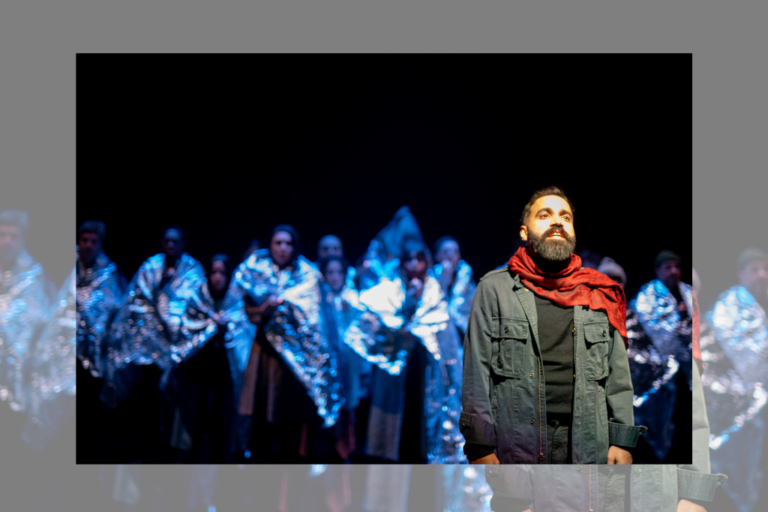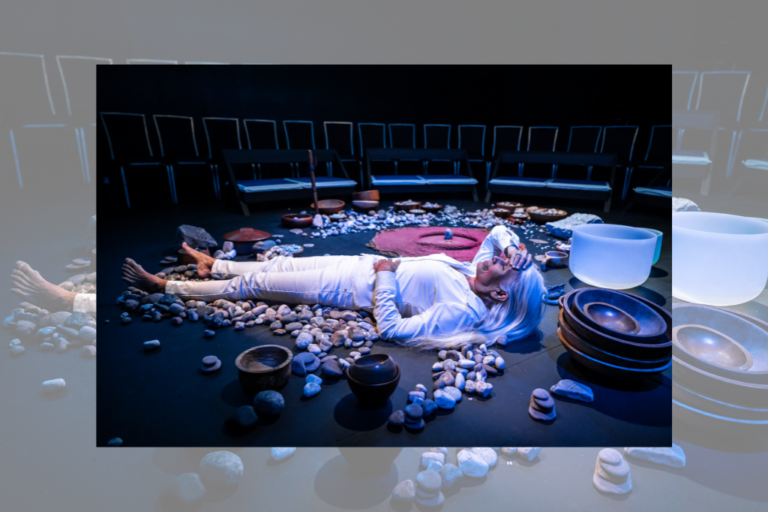REVIEW: Just like Luke Reece’s life story, As I Must Live It is open-ended
Luke Reece jovially hops down the stairs into the Theatre Passe Muraille lobby, and with this entrance, his solo show begins, his audience standing at the sidelines.
As the award-winning slam poet makes eye contact with every single audience member and segues into introducing the premise of his show, As I Must Live It, there are some things about him that stand out.
Firstly, he has a bright red backpack, on which sit several Toronto Raptors pins: we’ll get context for that later on, when he divulges his childhood obsession with dinosaurs.
Secondly, his engagement with the audience is magnetic as he deftly shifts locations within the crowd, stirring fascination by handing out props that will come in handy later.
Thirdly, it’s clear he has an ardent, nearly uncontrollable desire to say what he wants, and in the way he wants it.
Written by Reece, with Daniele Bartolini as director, As I Must Live It is imbued with Reece’s burning need to set straight the record of his life. And this makes sense: his school undercut his first childhood attempt of writing a story about squirrels by only publishing a portion of it. Although he laughs at the memory, the anecdote rests at the core of why he shares the heaviest scenes of his life with us.
But first, we meet Reece in the lighter, younger days of his life. When the audience comes into the theatre, we sit on round hassock stools in a circle around Jackie Chau’s set design of a simple, slightly elevated merry-go-round. Reece encourages the audience to feel comfortable shifting between their seats and the floor, and forms an intimately nostalgic experience akin to that of listening to a friend on the elementary school playground during lunchtime. Barret Hodgson & Thom Buttery’s projections of Reece’s family photos and writing excerpts on the screens throughout the show are equally welcoming gestures into Reece’s life story.
At one point during the recollection of his childhood, Reece spends a significant amount of time in a green T-Rex costume to stress his attachment to the Jurassic Park franchise, but this section felt long, and perhaps not as entertaining as it was intended to be. That said, Reece overall succeeds in creating emotional proximity between the audience and his childhood. As he chatters in glee on his memories of growing up in Toronto with an Italian mother and Barbadian father, everything is light, warm, and fairly comical.
Until we learn about the time his father was let go from his job.
Reece was only 10 then, and in the following years, his father has never fully recovered from the obsessive-compulsive disorder (OCD) and depression he developed post-unemployment. Soon enough, Reece dismantles the merry-go-round into four pieces, no longer hopping on it in carefree serenity.
The most hurting facet of the production is witnessing how hard Reece attempted from a young age to understand his father, as well as his place in his father’s life. He dedicated his most formative years as a child and teenager to dissecting his father’s mind, which always seemed to be just out of grasp. But, in his show — dressed how he would have dressed at a younger age — Reece reaches into the past to understand his own young self, too, someone he may have inevitably neglected growing up.
In this way, Reece shows us that he hasn’t yet figured out his whole story, and is still in the process of tracking and understanding his life footprints. This is also what Reece sanguinely tells us in spoken-word poetry at the end of his show: he and his story don’t have an ending.
But, as he comes to this conclusion, he collects and combines the hitherto separated sections of the merry-go-round, and eventually, it looks just as it did in the beginning. Reece has let us into his 90-minute journey to reflect that while he and his father had their battles, the difference is that now, he’s talking about it.
A while back, Reece discovered physical copies of his father’s own written meditations on his mental illness — meditations which he photocopied and chose to share with the audience. After he shares the intricate details of his father’s life, Reece asks us to cover him with the photocopies as he lays still in the middle of the carousel with his eyes closed: physically embodying the words and stories of his father.
While his father’s stories had only reached as far as the paper, Reece is breathing life into them and extending his father’s voice. Reece is in control of the narrative, as he is in control of bringing back the pieces of the merry-go-round of stories, and of the next chapter of his and his father’s life.
As much as this moment and the show as a whole are significant for Reece, they both seem to exist for Reece only, an idea he doesn’t shy away from admitting. He openly declared during the show I attended that he’s not doing this for the audience, and I couldn’t help but wonder what that concession meant in a show that invited people to listen to the chapters of his life.
Until I heard the man sitting next to me cry. And I understood. I understand that Reece reached who he needed to reach and I understand that there will always be parts of life that I don’t understand and must only be an audience to. And that complexity was beautiful to observe.
As I Must Live It runs at Theatre Passe Muraille until March 2. Tickets are available here.
Intermission reviews are independent and unrelated to Intermission’s partnered content. Learn more about Intermission’s partnership model here.












Comments